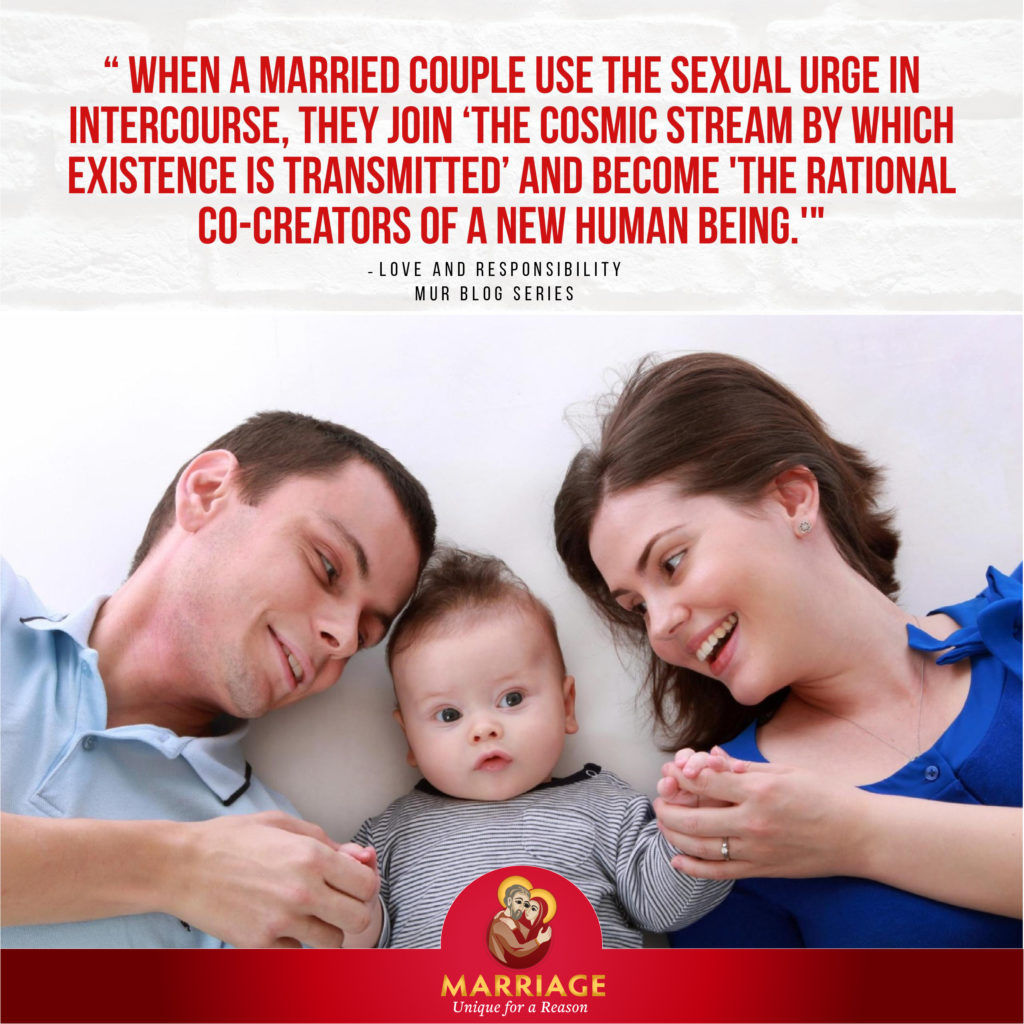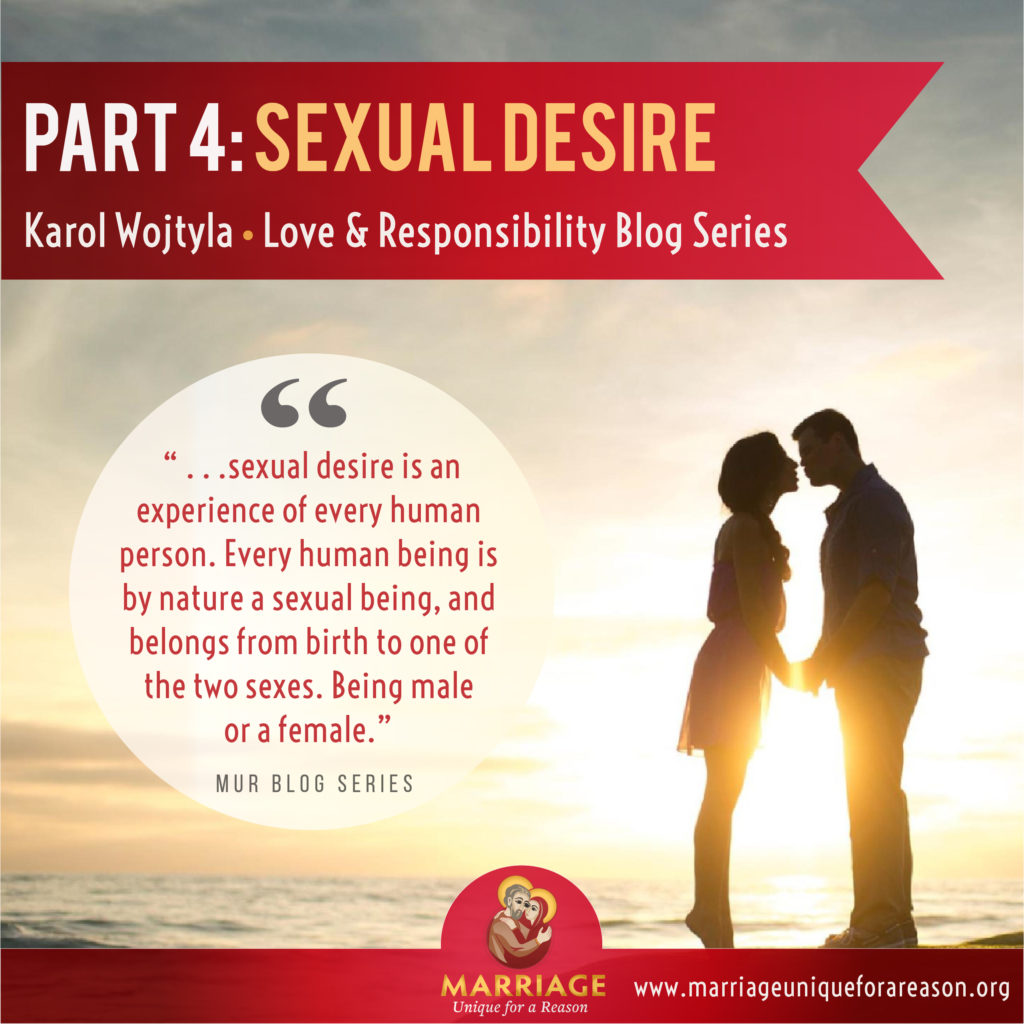
The Human Person’s Sexual Desire:
The second major section in the first chapter of Love and Responsibility is called “Interpretation of the Sexual Urge”—we are going to call this “sexual desire” since that is more familiar. In this section, Wojtyla lays out a few different ways of looking at sexual desire in the life of a human person.
Sexual desire is “instinctual” in the human being in that it is aimed at the survival of the species and is not a result of conscious deliberation. But while instinct implies a blind force that must be obeyed, sexual desire, while it is a natural drive, does not compel a person to obey it. After all, “Man is by nature capable of rising above instinct in his actions.”[1] While bodily reactions occur without a person choosing them, ethics come into play as soon as the person makes a choice.
 “Man is not responsible for what happens to him in the sphere of sex since he is obviously not himself the cause of it, but he is entirely responsible for what he does in this sphere.”[2] [Author’s note: Teaching young people the difference between a reaction they are not responsible for and a deliberate choice to consent to the reaction or further it is an important task for parents, youth ministers, pastors, and other trustworthy adults.]
“Man is not responsible for what happens to him in the sphere of sex since he is obviously not himself the cause of it, but he is entirely responsible for what he does in this sphere.”[2] [Author’s note: Teaching young people the difference between a reaction they are not responsible for and a deliberate choice to consent to the reaction or further it is an important task for parents, youth ministers, pastors, and other trustworthy adults.]
Wojtyla notes that sexual desire is an experience of every human person. “Every human being is by nature a sexual being, and belongs from birth to one of the two sexes.”[3] Being male or a female “means that a person’s whole existence has a particular orientation which shows itself in his or her actual internal development… and in the normal course of things… manifests itself in a certain natural predilection for, a tendency to seek, the other sex.”[4] In other words, we are “oriented” in an objective way: male toward female, female toward male.[5]  It is written into our bodies. “Sexual attraction,” Wojtyla writes, “makes obvious the fact that the attributes of the two sexes are complementary, so that a man and a woman can complete each other.”[6] Each of the sexes reveals one of the two ways of being human.
It is written into our bodies. “Sexual attraction,” Wojtyla writes, “makes obvious the fact that the attributes of the two sexes are complementary, so that a man and a woman can complete each other.”[6] Each of the sexes reveals one of the two ways of being human.
The continuation of humanity depends on individual people “obeying” their natural sexual desire and giving life to new human beings. Wojtyla argues that because sexual desire leads to new persons who have immortal souls, it is not solely of biological significance but existential: “It is bound up with the very existence of the person.”[7] Sexual desire thus gives an objective purpose and a shape to the love between a man and a woman—i.e. it’s important not just for the two of them, but for the world.[8]
The Religious Interpretation of Sexual Desire:
In the next sections, Wojtyla addresses the religious interpretation of sexual desire, followed by two misinterpretations. The religious significance of sexual desire is that it furthers the work of creation: when a married couple use the sexual urge in intercourse, they join “the cosmic stream by which existence is transmitted”[9] and become “the rational co-creators of a new human being.”[10] The two misinterpretations are: 1.) the body is evil and sexual intercourse is only a “necessary evil” for procreation and, 2.) a tendency to see all of human behavior in light of sexual desires and the pursuit of sexual pleasure. Wojtyla shows that neither of these interpretations are adequate.
In his “Final Observations,” Wojtyla writes that the Church has always taught two ends of marriage: procreation and mutual help. These aims will be fulfilled by following the personalistic norm (The only proper response to another human person is love). “Sexual morality and therefore conjugal morality consists of a stable and mature synthesis of nature’s purpose with the personalistic norm.”[11] In other words, knowing what is right and wrong when it comes to sex depends on knowing what nature’s purpose is (sex = babies) and what the loving thing to do is (according to what [who] a human person is). These things together are what give an objective form to love between man and woman.
[1] Wojtyla, Karol. Love and Responsibility (San Francisco: Ignatius Press, 1993), p. 46.
[2] Ibid, p. 47.
[3] Ibid, p. 47. Wojtyla notes here that this fact is not contradicted by persons who are born with ambiguous genitalia and the like, any more than any other disorder or disability puts human nature into question.
[4] Ibid, p. 48.
[5] The term “sexual orientation” today denotes a subjective feeling of attraction, but such a feeling can never change the objective nature and purpose of one’s sexual nature.
[6] Ibid, p. 48.
[7] Ibid, p. 52.
[8] Ibid, p. 53.
[9] Ibid, p. 54.
[10] Ibid, p. 55.
[11] Ibid, p. 67.
Thus ends the section on “The Person and the Sexual Urge.” Next, Wojtyla discusses “The Person and Love.”
[1] Love and Responsibility, p. 46.
[2] Ibid, p. 47.
[3] Ibid, p. 47. Wojtyla notes here that this fact is not contradicted by persons who are born with ambiguous genitalia and the like, any more than any other disorder or disability puts human nature into question.
[4] Ibid, p. 48.
[5] The term “sexual orientation” today denotes a subjective feeling of attraction, but such a feeling can never change the objective nature and purpose of one’s sexual nature.
[6] Ibid, p. 48.
[7] Ibid, p. 52.
[8] Ibid, p. 53.
[9] Ibid, p. 54.
[10] Ibid, p. 55.
[11] Ibid, p. 67.



Leave a Reply